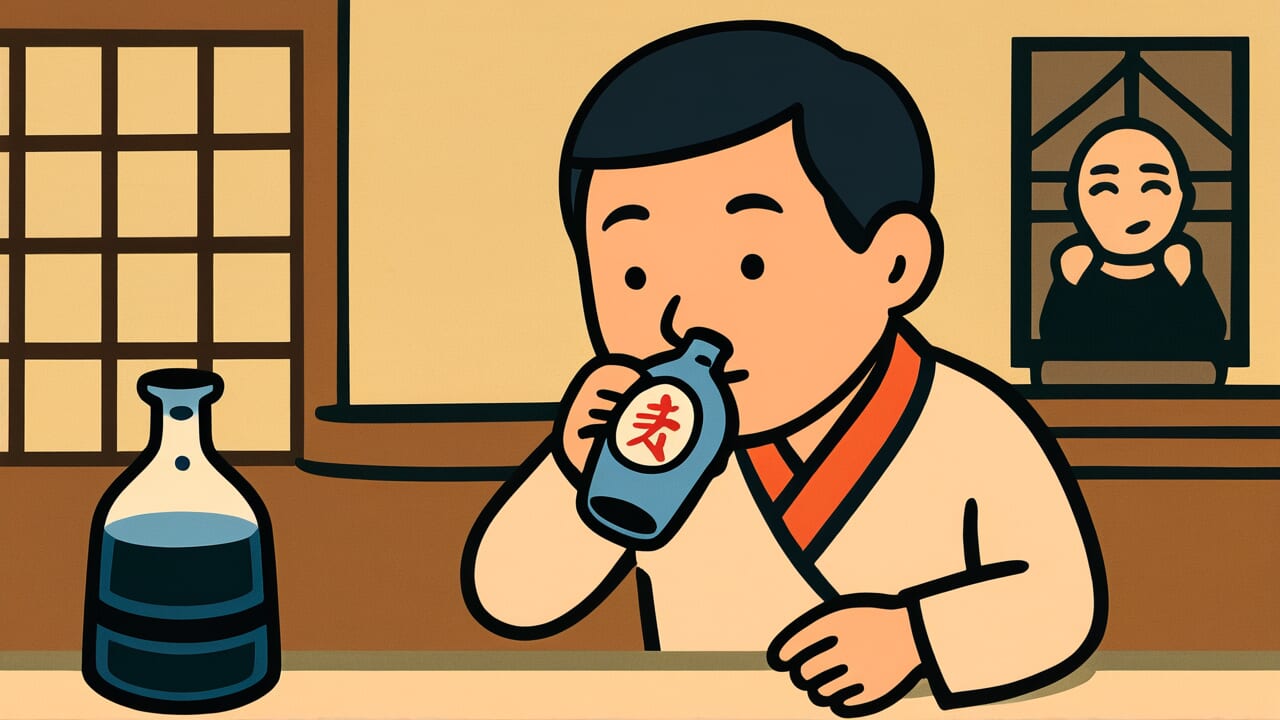How to Read “A drinker’s true nature doesn’t change”
さけのみほんしょうたがわず
Meaning of “A drinker’s true nature doesn’t change”
“A drinker’s true nature doesn’t change” means that when people drink alcohol, their real personality and true feelings come to the surface. Emotions and traits that are usually controlled by reason and social position emerge through the effects of alcohol.
This proverb also serves as a warning that how you behave when drinking reveals your true self. The excuse “I was drunk” doesn’t work. Whether you drink or not, your essential nature remains the same. This reflects a strict view of human character.
Even today, people often judge character based on behavior at drinking parties. A normally gentle person might become aggressive when drinking. Or a usually strict person might become kind.
This isn’t acting. The proverb teaches that these are the qualities the person naturally possesses coming to the surface. It remains a living lesson that we should be very careful about our behavior when drinking.
Origin and Etymology
The exact source of this proverb is unclear. However, it has been passed down since ancient times as an expression of the relationship between alcohol and human nature in Japan.
The word “true nature” refers to the real qualities and inner thoughts that people usually hide. In Japan, alcohol has long been called “the chief of all medicines.” At the same time, people recognized its power to loosen reason.
Even people who normally behave politely show their original personality when they drink. Many people knew this from experience.
The expression “doesn’t change” means “remains the same” or “stays as it is.” In other words, whether you drink or not, your essential self doesn’t change. Rather, alcohol acts like a mirror that reveals the true self that is usually suppressed. This insight is embedded in the saying.
Behavior at drinking gatherings has been valued as an opportunity to judge someone’s true character. During the samurai era, records show that attitude when drinking was an important element in evaluating a person.
This proverb can be seen as a condensed expression of Japanese wisdom in observing human nature.
Usage Examples
- 昨日の飲み会で部長の本音が出たけど、酒飲み本性違わずで普段から思っていたことなんだろうな
- 彼は酔うといつも愚痴ばかりだが、酒飲み本性違わずというし、本当は不満を溜め込んでいるのかもしれない
Universal Wisdom
“A drinker’s true nature doesn’t change” offers deep insight into the dual nature of human existence. We live each day wearing various masks in society. Our face at work, our face at home, our face with friends.
These aren’t lies, but they aren’t complete truths either. A control device called reason constantly puts brakes on our instincts and emotions.
Alcohol loosens that control device. That’s why people have both feared and valued drinking gatherings since ancient times. Because there, a person’s true self becomes visible.
The coldness of someone who seemed kind. The warmth of someone who seemed strict. The anxiety of someone who seemed confident. The ambition of someone who seemed modest. Alcohol is an honest mirror that cannot lie.
This proverb has been passed down for so long because we instinctively understand the difficulty and importance of seeing through to human nature. We shouldn’t judge people only by their surface. But at the same time, the hidden true nature is also that person’s truth.
Our ancestors expressed this contradictory truth through the familiar presence of alcohol. The difficulty of knowing others, and the importance of knowing yourself. This is the universal wisdom contained in this proverb.
When AI Hears This
The “true nature” that emerges when drinking can actually be explained as a physical change in the brain. Alcohol weakens the function of a brain region called the prefrontal cortex.
The prefrontal cortex plays a role in putting on the brakes. When it weakens, behaviors and emotions that are usually suppressed come to the surface. In other words, behavior when drunk could simply be the result of removed inhibitions.
What’s more interesting is that physical changes occur in the brains of people who drink repeatedly. The neural circuit connecting the amygdala, which processes emotions, and the nucleus accumbens, which feels pleasure, is strengthened with each drinking session.
This is called neuroplasticity. Just as walking a mountain path repeatedly creates a trail, specific circuits in the brain become thicker and stronger the more they’re used.
Through this neural circuit strengthening, the behavior patterns that emerge when drinking aren’t just temporary changes. They become permanent responses carved into the brain. In other words, “yourself at drinking parties” isn’t a random product.
It’s a different operating mode fixed as a brain wiring diagram. It’s not that true nature doesn’t change. Rather, a different neural circuit activated by alcohol produces the same behavior each time. This shows that the concept of “true self” is actually a collection of multiple neural circuits.
Lessons for Today
What this proverb teaches modern people is the importance of self-awareness. When you drink alcohol, what kind of words and actions do you show? If the attitude that emerges there differs greatly from your ideal self, it might be a sign you need to reflect.
It’s easy to dismiss failures at drinking parties with “I was drunk.” But this proverb teaches us, strictly yet kindly, that this too is part of yourself. Accepting yourself, including the parts you don’t want to acknowledge, is the first step toward growth.
At the same time, this proverb offers hints for understanding others. People are multifaceted beings. The face shown at drinking parties and the everyday face are both that person’s truth.
Don’t judge based on just one side. An attitude of trying to understand various aspects is important.
Above all, this proverb teaches the importance of self-control. Is it okay to have relationships where you can only speak your true feelings with alcohol’s help?
If you live honestly every day, you won’t feel ashamed at drinking parties. We should aim for that kind of life.



Comments